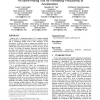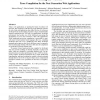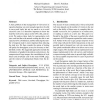64 search results - page 9 / 13 » Designing floating codes for expected performance |
ICS
2011
Tsinghua U.
12 years 10 months ago
2011
Tsinghua U.
Suppose one is considering purchase of a computer equipped with accelerators. Or suppose one has access to such a computer and is considering porting code to take advantage of the...
PROMISE
2010
13 years 2 months ago
2010
Background: Defects are related to failures and they do not have much power for indicating a higher quality or a better system above the baseline that the end-users expect. Nevert...
VEE
2009
ACM
14 years 2 months ago
2009
ACM
Today’s web applications are pushing the limits of modern web browsers. The emergence of the browser as the platform of choice for rich client-side applications has shifted the ...
SASP
2008
IEEE
14 years 1 months ago
2008
IEEE
—Accelerators are special purpose processors designed to speed up compute-intensive sections of applications. Two extreme endpoints in the spectrum of possible accelerators are F...
SYSTOR
2010
ACM
13 years 7 months ago
2010
ACM
A basic problem in the management of web servers is capacity planning: you want enough capacity to be able to serve peak loads, but not too much so as to avoid excessive costs. It...



